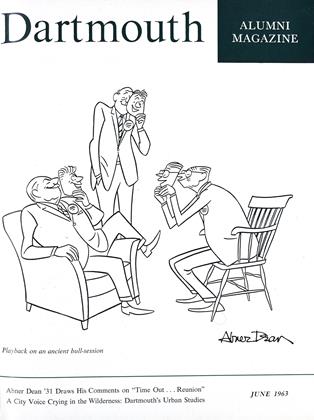Compiled by Clyde E. Dankert. Hanover,1963.
Clyde Dankert, long known as an authority on labor economics, also teaches at the College the history of economic thought (Economics 64). This congenial assignm ent has resulted in his developing an unusual and also productive busman's hobby. He has become interested in Adam Smith's relationships with other famous authors and in evaluating Smith's stature as a man of letters. In consequence of this excursion into belles-lettres, Professor Dankert has published articles in the Dalhousie Review,Queen's Quarterly, and Studies in Literatureand Language, and as a by-product — an appropriate economist's term - of these literary labors he has also collected and edited the small but choice anthology of Thoughts from Adam Smith that is the subject of this review.
All but a few of the quotations in Professor Dankert's selection are taken either from The Wealth of Nations (1776) or The Theory of Moral Sentiments (1759), about equally divided between the two books. To my taste the quotations from The Wealth ofNations are the more interesting, having more bite and snap than the quotations from the earlier work, which seems, in comparison, rather banal and platitudinous. The editor's notes are workmanlike, informative, and often humorous.
This small volume, which bears the imprint of Hanover, N. H., has been sumptuously designed and magnificently printed by the Stinehour Press of Lunenburg, Vermont. Persons desiring to procure Professor Dankert's anthology may obtain it there. The Stinehour Press, which has so quickly achieved an enviable reputation for the beauty of its work, is this year celebrating its tenth anniversary.
At the moment that I write. Hopkins Center has the honor of exhibiting (through the good offices of Professor Ray Nash, who is also the former teacher of Roderick Stinehour '50) some of the sixteenth-century typographical artifacts and magnificent example's of printing from the Plantin-Moretus Museum at Antwerp, the Hopkins showing being the first time that any Plantin-Moretus originals have been exhibited outside Europe. As one muses upon these treasures, one cannot help hoping that eventually some philanthropist or foundation will similarly embalm the Stinehour Press, so that in the twenty-third or twenty-fourth century the amateurs of fine printing may visit Lunenburg, Vermont, and marvel at the skill of their twentieth-century forbears.
 View Full Issue
View Full Issue
More From This Issue
-
 Feature
FeatureAs the Century Turned
June 1963 By Edward Connery Lathem '51 -
 Feature
FeatureA CITY VOICE CRYING IN THE WILDERNESS
June 1963 By H. WENTWORTH ELDREDGE '31 -
 Feature
FeatureNine of Dartmouth's Distinguished Professors Retire on June 30
June 1963 -
 Feature
FeatureTIME OUT ... REUNION
June 1963 By Abnez Dean -
 Class Notes
Class Notes1931
June 1963 By WILLARD C. WOLFF, WILLIAM T. WENDELL -
 Books
BooksLew Stilwell: A Fine Teacher
June 1963 By JAMES L. MONTAGUE '28
ARTHUR M. WILSON
-
 Article
ArticleDemocratic Thought
December 1941 By ARTHUR M. WILSON -
 Books
BooksL'AMOUR EN BOUTON,
January 1951 By ARTHUR M. WILSON -
 Books
BooksLA GUERRE D'UN BLEU.
October 1954 By ARTHUR M. WILSON -
 Books
BooksTHE LITERARY ART OF EDWARD GIBBON.
June 1960 By ARTHUR M. WILSON -
 Books
BooksHUMAN NATURE AND POLITICAL SYSTEMS.
November 1961 By ARTHUR M. WILSON -
 Books
BooksMIDDLING NESS:
APRIL 1966 By ARTHUR M. WILSON
Books
-
 Books
BooksQuestions on the Principles of Economics
January 1916 -
 Books
BooksAlumni Publications
November 1944 -
 Books
BooksTHE MOLLY MAGUIRES.
DECEMBER 1964 By EDWARD C. KIRKLAND '16 -
 Books
BooksCHICAGO: THE SECOND CITY
July 1952 By Herbert F. West '22 -
 Books
BooksBut No B-52's
October 1975 By JOHNHURD '21 -
 Books
BooksFACULTY PUBLICATIONS
June, 1922 By W. H. WOOD


